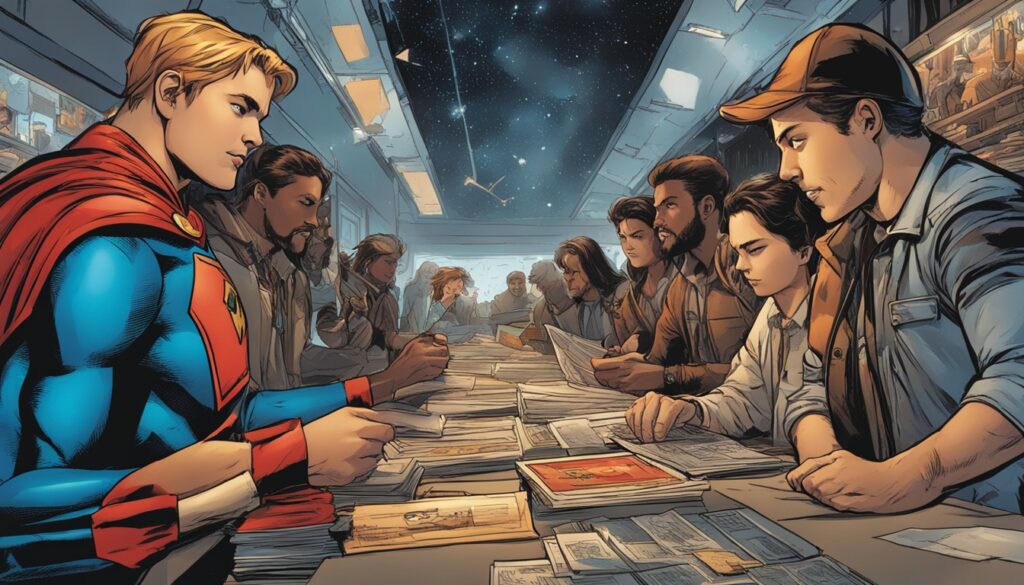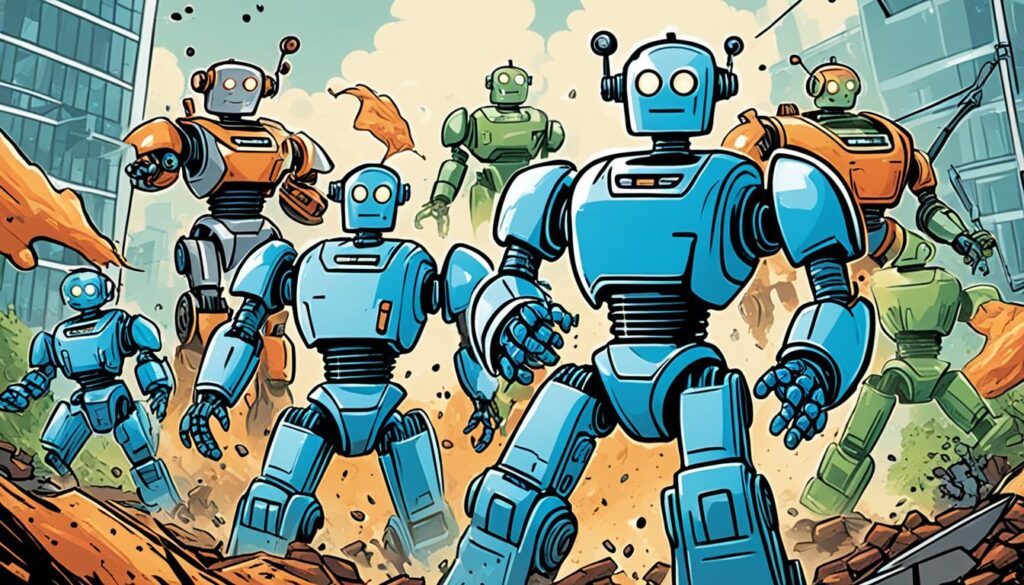Did you know that the charity and non-profit organizations market was over US$305.2 billion in 2023? This was up from US$288.97 billion the year before. Now, it’s aiming to hit US$369.21 billion by 2027. The surprising part is that young people from Generation Z are leading this growth. They may have less money, but about 70% of them are putting social good first in their spending and charity work. Their dedication merges the power of AI with generosity, changing how charities work.
These big numbers show that technology is changing the face of giving. Artificial Intelligence isn’t just a dream. It’s a key partner for those wanting to make a difference worldwide. Experts predict by 2030, AI could help pump up to US$15.7 trillion into the global economy. This could usher in an era of innovation for charities. Now, using tech for good isn’t a choice but a must. Initiatives like Lifeforce are leading the way in making digital charity work more effective than ever.
Organizations like Save The Children Australia and Greenpeace are leading this tech revolution in charity. They show that AI can make a big difference. This trend runs deep, affecting not just big names but also local heroes. People like Jessica Wong, CPA, are using their skills to volunteer in meaningful ways. Here, the meeting of tech and goodwill offers unmatched rewards for both personal growth and making a difference.
You don’t need to be a tech genius to be part of this change. Your support for AI in charity can be in different forms. For example, it might be cheering on the tech experts or understanding how these tools make charity work better. Looking at what AI can do, remember its true power isn’t just in money. It’s in the lives it changes for the better, all through meaningful giving.
Introduction to AI’s Role in Charity
The world of giving is changing, thanks to Artificial Intelligence (AI). AI is leading a huge shift in the way charities work. It’s bringing in a new era of Nonprofit Innovation with AI. This makes charities work better, making it easier to connect with donors and volunteers.
AI is doing a lot for charities. It’s now handling tasks like entering data and looking at trends. This lets charities focus more on their big goals instead of boring tasks. AI even helps find donors who might want to give more, by spotting patterns.
AI is also improving how charities talk to donors. Thanks to AI chatbots, charities can answer questions fast and personally. This makes donors feel more connected and cared for. This Digital Solution for Nonprofits boosts communication and nurtures strong donor relationships.
But using AI in charities can be tough at first. It can cost a lot and needs strict rules to protect data. Yet, as AI gets cheaper and more common, these challenges will lessen. This makes AI more available to all charities, no matter their size.
AI is making big changes in charity work. It’s helping charities run smoother, raise more money, and spend less. By using data well, charities can make smarter choices for the long term. This way, they can grow and do more good for the community.
Looking at all the benefits of AI in charity, we must also think about ethics. It’s key that AI is used fairly and transparently. This builds trust with the public and everyone involved with the charity.
In the end, AI is a great tool for charities to do better. It’s not just about working smarter, but also about making a bigger difference in the world. The journey to use AI in charities shows a real push for innovation and careful change in charity work.
The Impact of AI on Charity Sector Services
Artificial Intelligence (AI) is changing the way the charity sector works. It’s not just improving things; it’s transforming processes. For example, Volunteer Matching AI connects people with the right volunteer work. And AI Donation Impact Analysis makes sure donations have the best possible impact. AI is bringing a new level of efficiency and personalization to charity work.
Volunteer Matching AI
Think about an AI system that finds the perfect volunteer work for you. It looks at what you’re good at and what you really care about. This system is out there now, using AI to ensure volunteers are happy and engaged. Especially in big events or crises, it helps match volunteers with the tasks where they’ll be most effective.
Social Cause Identification with AI
AI is amazing at finding important social issues we might miss. This skill lets charities respond quickly and directly to the most critical needs. With AI Donation Impact Analysis, it’s not just about finding general areas that need help. It’s about pinpointing exactly where to focus for the best results.
Related Charity Assistance Apps
AI isn’t just for big projects. It’s also making charity work more accessible through apps. These apps help connect people in need with the help they require, making charity work easier for everyone involved. They enhance the volunteer experience and also streamline the path to offering support to those in need.

Charities that use AI are not just getting new tools. They’re entering a new age of service. With a focus on matching volunteers well and tracking donation impact, AI is revolutionizing how charities work. It’s leading to more innovation in how philanthropy service is provided.
Optimizing Fundraising Strategies with AI
Artificial Intelligence in Philanthropy is causing big changes. It’s making fundraising management better for charities. This happens through AI Fundraising Strategies.

In our digital world, Charitable Giving Advancements matter a lot. AI helps nonprofits create campaigns that really fit their donors. This makes people more interested and boosts donations.
Advantages of AI in Fundraising
With AI, charities can use data smartly. They can predict what donors might do. This leads to creating messages that really touch people.
AI takes over tasks that are done over and over again. This means human workers can focus on important things. For example, chatbots can talk to donors first, answering their questions right away.
Artificial Intelligence in Philanthropy also guides when and how much to ask donors. This can lead to more and lasting support. AI helps charities build strong ties with their supporters. This way, they attract more donations and have a bigger impact.
Fusing AI Fundraising Strategies with Charitable Giving Advancements is powerful. It helps charities beat their fundraising goals in today’s tough world.
Ethical Considerations in AI for Charities
Charities are getting more into Artificial Intelligence (AI). Now, it’s critical for Ethical AI in Charities to be a top priority. As technology changes, charity work must, too.
It’s key to think about fairness and privacy when using AI. We need to focus on making AI helpful and fair in the charity world.
Addressing Algorithmic Bias
Algorithmic bias is a major ethical issue. It’s about keeping the charity’s true values intact. AI learning from big sets of data might pick up and even make biases worse.
But, by testing and improving AI systems all the time, we can avoid this. This ensures fair decisions are made without bias.
Donation Impact Analysis
AI is also changing how charities look at their donation projects. With AI tools, they can sift through lots of data to see what works. This way, they can make sure every donation really makes a difference.
It’s not just about using fancy tech, though. It’s about creating a culture that thinks about being ethical all the time. This helps charities use AI well, sticking to honesty and fairness. This way, the tech helps in making real, positive changes in society.
The Future of AI in Charity Sector Jobs
Nonprofit work is changing. It’s now all about Digital Solutions for Nonprofits. This change not only alters how charities work but also the skills their teams need. The rise of Nonprofit Innovation with AI is shifting towards using technology more in charity work. This shift requires a strong plan for those in the Future of AI in Charity Jobs.
The Importance of Acquiring New AI-Related Skills
AI is quickly being adopted in the charity world, needing new skills. As someone in charity work or looking to start, learning about AI is key. This means becoming skilled in data analysis, AI algorithms, and digital tools. By continually learning about machine learning, natural language processing, and predictive analytics, you can use AI better. This helps in improving charity funding and how smoothly they run.
Adapting to AI-driven Systems
Being able to work with AI systems is important for charity workers today. This is vital for both newer and experienced professionals. Adapting is more than knowing how to use new software. It’s about changing how you work to include digital and automated processes. This could mean using AI insights to better connect with donors, or managing resources more effectively during hard times. Being able to work with AI in your everyday duties is a key skill now.
Conclusion: Embracing AI in Charitable Initiatives
Artificial Intelligence in Philanthropy is making waves in the charity world. Nonprofits are noticing big changes by using AI. More donors are joining in, giving more, and sticking around. AI helps predict what donors might do and makes their experiences better. Using AI is a smart step for charities aiming to keep up with technology.
Nonprofit Innovation with AI is a big hit in the U.S. and elsewhere. By understanding what their supporters like, charities can ask for donations in a smart way. This approach boosts how close donors feel to the charity. AI also helps by doing boring jobs, giving workers time for more important tasks. Even small charities can use powerful AI like GPT-3 because it’s cost-efficient.
But, being tech-savvy means being ethical. It’s key to use AI in a fair and transparent way, sticking to rules that match your charity’s values. While taking on this new tech, it’s important to remember a charity’s heart is in the people it helps. Setting up smart rules for how to use AI helps avoid privacy and bias issues. Doing AI right not only boosts your charity’s goals but makes sure your work truly helps those in need.
